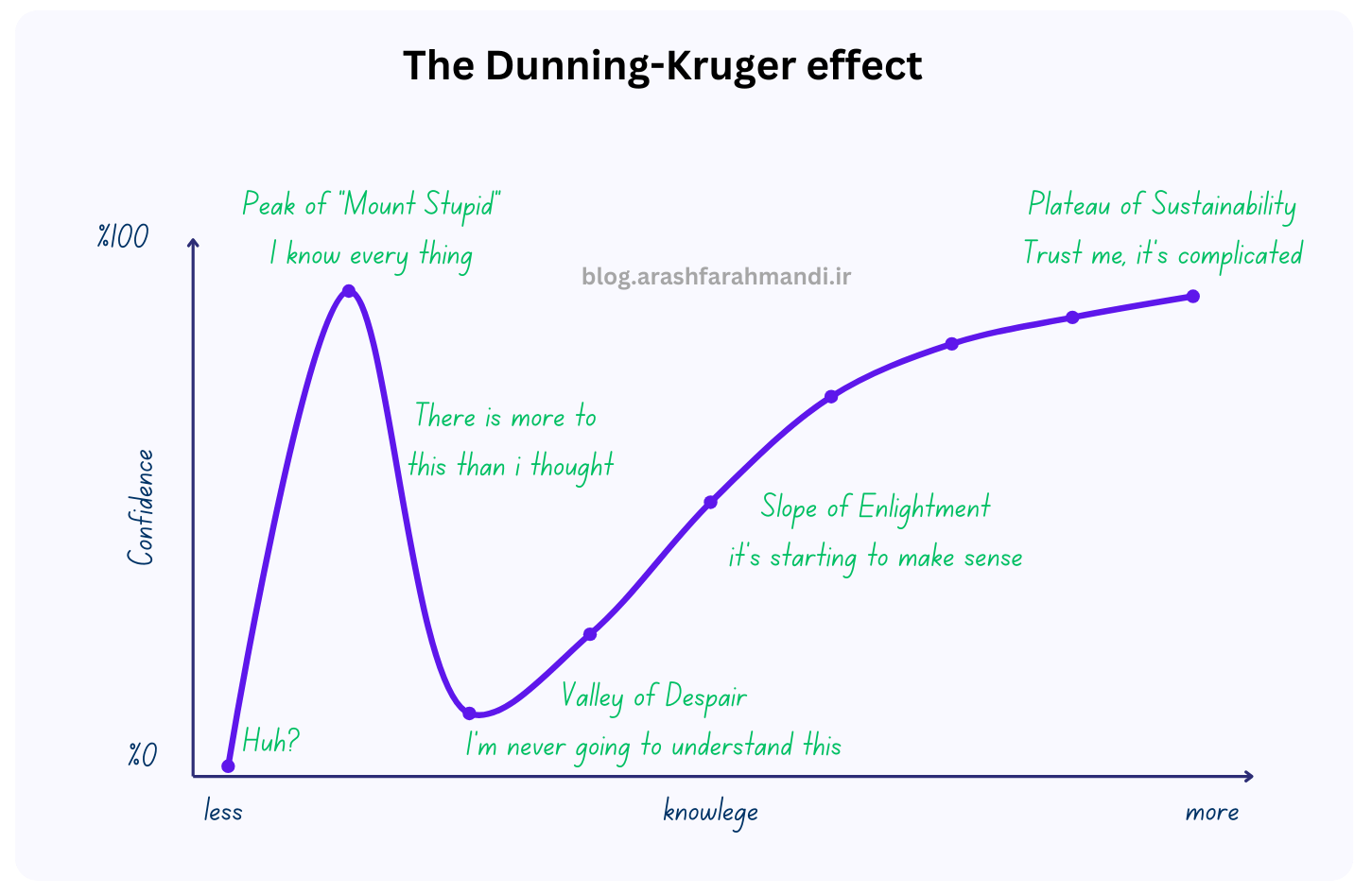People who are incompetent in a certain area often lack the self-awareness to recognize their own incompetence and mistakenly believe they are highly skilled or knowledgeable. This bias can lead to poor decision-making, overconfidence, and an inability to accurately assess one's own abilities.
Conversely, individuals with higher competence in each area may underestimate their abilities due to assuming others have similar knowledge and skills. The phenomenon where individuals with limited knowledge or skill tend to exhibit greater confidence is known as the Dunning-Kruger effect.
The Dunning-Kruger effect refers to the tendency for individuals with low competence in a domain to overestimate their abilities.
The Dunning-Kruger effect is named after the two social psychologists who first described and researched the phenomenon, David Dunning and Justin Kruger. In 1999, Dunning and Kruger published a study titled "Unskilled and Unaware of It: How Difficulties in Recognizing One's Own Incompetence Led to Inflated Self-Assessments." Their research shed light on the cognitive bias of overestimating one's abilities in areas where they lack competence, while also highlighting the lack of metacognitive skills necessary to accurately assess one's own competence. Due to their significant contributions in identifying and explaining this cognitive bias, the phenomenon came to be known as the Dunning-Kruger effect.

Let’s delve into why Dunning-Kruger effect occurs:
Lack of Metacognition: People with lower expertise often lack the ability to accurately assess their own competence. This deficiency in metacognition (the awareness of one’s own cognitive processes) leads them to overestimate their abilities.
Illusion of Superiority: The Dunning-Kruger effect arises from an illusion of superiority. When individuals possess only a basic understanding of a topic, they may mistakenly believe they have mastered it. Their limited knowledge prevents them from recognizing the gaps in their understanding.
Cognitive Biases:
Confirmation Bias: People seek information that confirms their existing beliefs. In the case of low competence, this bias reinforces their overconfidence.
Anchoring Bias: Initial impressions heavily influence subsequent judgments. If someone starts with an inflated self-assessment, it becomes their mental anchor.
Incompetence Hinders Self-Reflection:
Mountains of Ignorance: As the saying goes, “In the land of the blind, the one-eyed man is king.” When individuals lack knowledge, they may not even realize the vastness of what they don’t know.
Competence Requires Insight: True competence involves recognizing one’s limitations and seeking improvement. Incompetence often blinds people to their deficiencies.
Social Factors:
Social Reinforcement: Encouragement from others can reinforce overconfidence. If peers or family members praise someone’s limited abilities, they may become more self-assured.
Fear of Appearing Ignorant: Admitting ignorance can be uncomfortable. To avoid embarrassment, people may project unwarranted confidence.
Learning Curve: As individuals gain more knowledge, they often experience a reversal in their self-assessment. The more they learn, the more they recognize their limitations, leading to modesty.
Remember, the Dunning-Kruger effect highlights the importance of continuous learning, self-reflection, and open-mindedness.
Let’s explore some examples:
In a Professional Environment:
- Imagine a novice employee who recently joined a company. Despite limited experience, they confidently believe they understand complex processes better than their seasoned colleagues. Their overestimation of competence may lead to poordecision-making and friction within the team.
Personal Characteristics:
- Individuals with the Dunning-Kruger effect often exhibit unwarranted confidence in their abilities. For instance, someone who believes they are an excellent driver despite frequent traffic violations or accidents.
Rate Your Knowledge:
- Have you encountered people who confidently assert their expertise on a topic without understanding it? This could be a manifestation of the Dunning-Kruger effect. They overestimate their knowledge and underestimate the complexity of the subject.
Singing Talent Shows:
- Talent shows often feature contestants who believe they have exceptional singing abilities. However, their actual performance falls short due to their lack of self-awareness about their vocal limitations.
Politics:
- In political discussions, individuals may confidently express strong opinions without fully grasping the nuances of policies or historical context. Their overconfidence can hinder constructive dialogue.
Jimmy Kimmel Interviews:
- Jimmy Kimmel’s “Lie Witness News” segments highlight people confidently discussing fictional events or made-up facts. These participants unknowingly demonstrate the Dunning-Kruger effect by confidently asserting false information.
Finances:
- Novice investors who believe they have mastered the stock market may take excessive risks. Their inflated confidence can lead to financial losses due to inadequate understanding of market dynamics.

